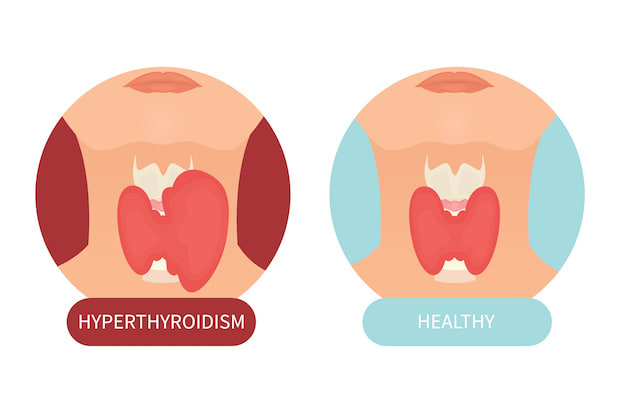Table of Contents
II. Why Do Thyroid Problems Occur?
III. Understanding Hypothyroidism
V. Understanding Hyperthyroidism
VII. Diagnosing Thyroid Problems
What Does the Thyroid Do?
The thyroid gland is essential to many hormonal processes in the body. This small, two-inch-long gland is located in the front of the neck and controls metabolism. The thyroid is part of the endocrine system. This system is composed of many glands that release hormones into the bloodstream. Endocrine hormones control mood, growth, and development, influencing almost every cell in the body.
The thyroid is responsible for the thyroxine and triiodothyronine hormones. These hormones control the rate at which cells burn fuel from food to make energy. If there is more thyroid hormone in the body, the metabolism may burn fuel faster. If there is a lack of the hormone, the metabolism slows, leading to weight gain. [1]
The thyroid also has four tiny glands that work together. These small glands are called the parathyroids, which release the parathyroid hormone. This hormone controls calcium levels in the bloodstream. Read on to learn more about thyroid disorders and medications like Synthroid (levothyroxine), desiccated thyroid, and Tapazole (methimazole). [1]
Get savings updates for Synthroid
Why do Thyroid Problems Occur?
Thyroid problems can range from a mild goiter (enlarged gland) to thyroid cancer. Some thyroid problems require no treatment at all, while others need treatment immediately. If the thyroid is producing excessive hormones, it is known as hyperthyroidism. Alternatively, hypothyroidism occurs when the thyroid does not produce enough hormones. Both problems come with their unpleasant symptoms, but most thyroid conditions can be treated with the proper medications.

If you have type 1 diabetes, you are at a higher risk of developing thyroid disease than those without diabetes. Type 1 diabetes patients are more at risk because it is an autoimmune disorder. Autoimmune disorders occur when the immune system attacks its tissues. Many causes behind thyroid issues, especially hypothyroidism, involve autoimmune conditions. Doctors have found that if you have one autoimmune disorder, you are more likely to develop another. [2]
Understanding Hypothyroidism
This thyroid problem involves an underactive thyroid, which means that the gland does not produce enough thyroid hormones. Hypothyroidism can lead to several health problems but may not cause immediately noticeable symptoms. Symptoms of hypothyroidism involve:
- Fatigue
- Puffy face
- Hoarseness
- Muscle weakness
- Constipation
- Increased sensitivity to cold
- Depression
- Muscle aches
- Elevated blood cholesterol
- Enlarged thyroid gland (goiter)
- Thinning hair
Because the thyroid hormone slows down metabolism, you may also notice a slight weight gain. Some people may attribute it to getting older, but you may want to talk to your doctor if you gain weight quickly. Hypothyroid symptoms often develop slowly over many years. If you feel tired all the time for no reason and have other symptoms like a puffy face or dry skin, you may have hypothyroidism. [3]
Causes of Hypothyroidism
There are several possible causes of hypothyroidism. The thyroid is a small gland, but many different factors can influence the release of thyroid hormones. Possible causes include:
Autoimmune diseases: Hashimoto’s thyroiditis is a common autoimmune condition that results in hypothyroidism. This disorder involves antibodies in the immune system attacking the thyroid. Thyroid tissue may die and stop producing hormones altogether.
Radiation treatment: If you have hyperthyroidism (too much thyroid hormone), you may undergo treatments that involve radioactive iodine and other anti-thyroid medications. Radiation treatments may regulate the thyroid, but sometimes that treatment can result in permanent hypothyroidism.
Certain medications: Medications like lithium can lead to hypothyroidism. Lithium is often used to treat bipolar disorder, so talk to your doctor if you notice hypothyroid symptoms. You are also more likely to develop hypothyroidism if you are a woman, older than 60, and have a family history of thyroid disease. If you have had thyroid surgery in the past, you may want to keep an eye on your symptoms to ensure you are not experiencing hypothyroidism. [3] Hyperthyroidism involves the production of too much thyroxine hormone. This condition has the opposite effect of hypothyroidism and leads to an acceleration of the body’s metabolism. Ignoring hyperthyroidism can lead to severe side effects, but it typically responds well to a treatment plan. It may be difficult to diagnose because hyperthyroidism can mimic several other health problems. The symptoms can vary significantly from person to person, and you may experience: If you are an older adult, you are more likely to have little to no hyperthyroidism symptoms. Subtle symptoms like increased heart rate, heat intolerance, and tiredness may be harder for older adults to notice. [4] Many conditions can lead to the development of hyperthyroidism. You may develop too much thyroxine for the following reasons: Graves’ disease: This is an autoimmune disorder that causes the body’s antibodies to produce too much thyroid hormones. Graves’ disease is the most common cause of hyperthyroidism. It is common, affecting one in 200 people in the United States. Graves’ occurs most commonly in people between 30 and 50 years old. [5] Thyroiditis: Thyroiditis is the inflammation of the thyroid gland. This may occur due to pregnancy, autoimmune conditions, or for unknown reasons. If the thyroid is inflamed, thyroid hormone may leak out of the gland into the bloodstream. Thyroiditis may or may not cause pain. [4] Plummer’s disease: This condition involves an enlarged thyroid gland that creates firm thyroid nodules and leads to an overproduction of thyroid hormones. These lumps are typically non-cancerous, but you should get them examined, especially if a goiter occurs. Plummer’s disease most often affects older people. [6] As mentioned above, thyroid disorders may be difficult to diagnose. There are many tests available to rule out other disorders and diagnose a thyroid issue. Your doctor will likely perform blood tests, imaging tests, and physical exams. Your doctor may physically examine your neck and feel for thyroid growth. If they notice that your thyroid is enlarged, they may order specific blood tests to measure antibodies, thyroxine, and thyroid-stimulating hormones. A blood test can tell how much thyroid hormone is being pumped into the bloodstream. You may also undergo an ultrasound on your thyroid gland so your thyroid can be examined. This procedure is painless and only takes about 20 to 30 minutes. Thyroid ultrasounds can help determine if your thyroid has nodules or a goiter. [2] Once your thyroid issue is diagnosed, several medications can properly regulate thyroid levels. Synthroid (levothyroxine) and desiccated thyroid are medications used to treat an underactive thyroid. Desiccated thyroid is a combination of hormones that help regulate the body’s energy and metabolism. [7] Synthroid works similarly and replaces thyroid hormone to treat thyroid disorders as well as goiters and thyroid cancer. [8] Tapazole (methimazole) is used to treat overactive thyroid problems. This anti-thyroid medication stops the thyroid from producing too much thyroid hormone. Tapazole is used before resorting to more serious treatment methods like thyroid surgery or radioactive iodine treatment. [9] Radioactive iodine works by shrinking the thyroid and reducing the amount of thyroid hormone in the bloodstream. If your thyroid continues to cause problems, you may have parts of it removed. This procedure is called a thyroidectomy. This surgery involves removing most of the thyroid gland. Once this gland is removed, you will need lifelong treatment with Synthroid to supply the body with the proper thyroid hormones. [4] The content in this article is intended for informational purposes only. This website does not provide medical advice. In all circumstances, you should always seek the advice of your physician and/or other qualified health professionals(s) for drug, medical condition, or treatment advice. The content provided on this website is not a substitute for professional medical advice, diagnosis, or treatment.
Understanding Hyperthyroidism
Causes of Hyperthyroidism

Diagnosing Thyroid Problems
Thyroid Treatments
